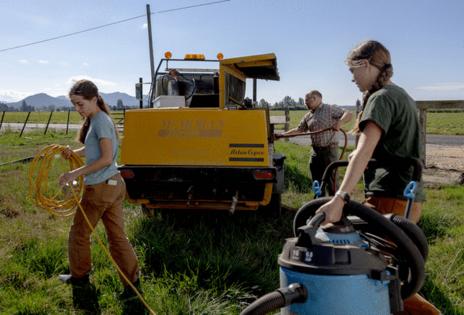3,700 Washington farms shut down in in 5 years. Why?
Published in Business News
Don McMoran is a fourth-generation farmer. And his family's farm in Mount Vernon, Washington, might end with him.
McMoran has two 16-year-old daughters. One is “mildly interested” in the family farm, he said, while the other is “a hard no.”
His story is one familiar to many Washington farm families. The stressors placed on farmers, including inflation, weather changes and tariffs, can all take a toll on their mental health, leading them to shut down their farms and leaving the next generation less interested in taking over. Over 3,700 farms shut down in Washington from 2017 to 2022, according to the Census of Agriculture.
McMoran grew up on his family's farm. He remembers the “good old days” when he'd work hard, but also made enough money to replace equipment or buy new land.
“It's fun when you're making money, but the flip side of that is when you work your tail off and you have to go to your banker and get a loan, that's not fun at all,” McMoran said.
The potential of a generational farm leaving the valley, that's a really hard pill to swallow,” he said.
A 2025 report conducted by the Washington State Department of Agriculture found the state’s farmer suicide rate far exceeds the national average. Agricultural suicides are nearly 25% higher than the overall state rate, according to the report. Strenuous lifestyle, lower access to mental health providers and the social stigma that comes with seeing a psychologist all contribute to higher suicide rates in these communities, the report said.
Many farmers also lack benefits such as health insurance, paid leave and retirement plans.
State Rep. Tom Dent, a Republican from Moses Lake, secured funding for the report and was on the committee that oversaw it. He said he understands the stressors firsthand as a farm owner. He's even had his own friends take their lives, he said.
Dent said the report is concerning but also eye-opening. Farmers face several economic stressors as profits fail to cover the increasing cost of labor and rising prices for fuel, fertilizer, seed and chemicals, according to the report. In 2023, labor expenses were 462% higher in Washington than the national average, according to data from the American Farm Bureau Federation. Another labor concern: Farms reliant on immigrant farmworkers have also faced uncertainty as President Donald Trump's administration began its immigration crackdown, though Trump has since curbed enforcement at farms. He's also indicated he may break from his pledge to deport all undocumented immigrants to allow migrant farmworkers to remain in the country.
Dent said that when working on a farm, there’s always something to do. With costs going up and farm products being worth less, it puts a bigger load on farmers. They stop going out for dinner and attending church, and all that’s left is the stress of the farm.
“When farmers are making money, there's no better job in the world,” McMoran said. “But to get up every morning, work your tail off to lose money. That's a really difficult situation to be in.”
'It's a 24-hour job'
When McMoran saw how stressed other farmers in his community were, he decided to do something.
About three years ago, he teamed up with Conny Kirchhoff, the associate director of the Washington State University psychology clinic, to launch a free therapy voucher program. McMoran had already been serving as director of Washington State University extension in Skagit County and principal investigator of the Western Region Agricultural Stress Assistance Partnership.
The voucher program offers six free sessions with Kirchhoff, a licensed psychologist, to all farmers and farmworkers living in Washington. While she does offer in-person sessions, most take advantage of the virtual option. That way it’s completely anonymous: No one can see their pickup and wonder what a farmer may be doing at a doctor's office, McMoran said, noting the stigma of reaching out for help is very apparent.
“From my upbringing, I was taught from a very young age to bite your lip, don't cry, don't complain, jump in, get the job done,” McMoran said.
Kirchhoff has observed financial worries are the No. 1 stressor for farmers.
“It's a 24-hour job,” Kirchhoff said. “Very often, if it's a farm that has been in a family for several generations, it feels like it's a personal failure if they have trouble on the farm.”
In addition to the therapy voucher program, McMoran also created Pizza for Producers. The initiative invites agricultural workers to learn how to make pizza and serves as a mental health workshop for farmers and farmworkers, who often work in solitude. The latest Pizza for Producers event was held this month.
In the 2025 report, many farmers listed the burdens that come with regulations as another stressor. Several said navigating government agricultural and grant programs while also ensuring compliance with new policies can be overwhelming. Farmers said understanding the bureaucratic language takes time and resources.
Dent said it's important for politicians to assess the regulatory load placed on farmers.
“Are we creating a further financial burden by some of the things that we've done through the Legislature, and if so, can we reduce that burden?” Dent said.
Some farmers even said they use specialists to interpret some of the legal jargon.
Farmers found loan repayment requirements to be some of the most confusing, according to the report.
McMoran said the regulations placed on farmers in Washington are much higher than in other states.
“When it all comes down to it, farming isn't as much fun as it used to be,” McMoran said.
Generational pressure
For some, the biggest stress can come from inside your own home.
Kids see the stress placed on their parents and don’t want to continue with farming. Farmers feel the stress of not letting down the generations that came before them.
McMoran said he doesn’t blame his daughters for not wanting to take over the farm. He knows how hard the work is and how low the returns are.
In his role with WSU extension, McMoran talks to many young people who share his daughters' view and don’t want to go into farming. The extension's agriculture and food systems program works with young people to get them excited about farming.
There are many farmers who’d love to pass on their farms to the next generation, McMoran said, but it's hard when there's not a lot of profit.
His parents told him his predecessors went through difficulties to find the perfect place to farm, just so it’d be his.
“You better not screw it up,” McMoran recalled. “That's a lot of pressure.”
Laura Siegel, the health communications officer for AgriSafe Network, a national nonprofit that educates health care providers and people working in agriculture, said that even when kids do want to take over, the hand off can be difficult.
For longtime farmers, handing over control feels like they're losing a part of their identity. That can lead to another tension point: when the younger generation has new ideas that older generations may not agree with.
Working with family can also get tough, though Siegel notes carving out time to spend together when no one discusses work or the farm can help.
Dent said that when he speaks with his constituents, a common sentiment is, “great-grandpa started this ranch, and I'm going to lose it.”
For farms that have been in a family for several generations, it can feel like a personal failure if someone has trouble on the farm, Kirchhoff said.
“We're always looking for solutions,” McMoran said. “I'd love to work myself out of farm stress suicide prevention work. This year, it's needed more than ever in history.”
©2025 The Seattle Times. Visit seattletimes.com. Distributed by Tribune Content Agency, LLC.

















Comments